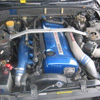Catch Cans? whats the deal
Announcements
-
Similar Content
-
Latest Posts
-
You're making my point for me. 95 is not "premium". It is a "slightly higher octane" version of the basic 91 product. The premium product that they want people to buy (for all the venal corporate reasons of making more profit, and all the possibly specious reasons of it being a "better" fuel with nicer additive packages) is the 98 octane stuff. 95 is the classic middle child. No-one wants it. No-one cares about it. It is just there, occupying a space in the product hierarchy.
-
98 and 95 have to meet the same national fuel standards beside the actual RON. 91 has lower standards (which are quite poor really), so 95 is certainly not 91 with some octane booster. It would be an easier argument to claim 98 is just 95 with some octane boosters. Also RON doesn't specify 'quality' in any sense, only the octane number. Anything different retailers decide or not decide to add to their 95 or 98 is arbitrary and not defined by the RON figure.
-
Anyone know alternatives to powerplus tungsten? Can't find an alternative online.
-
95 is just a scam outright. 98 is the real "premium" with all the best detergents and other additive packages, and at least historically, used to be more dense also. 95 is just 91 bargain basement shit with a little extra octane rating. Of course, there's 91 and there's 91 also. I always (back in the 90s early 2000s) refused to put fuel in from supermarket related fuel chains on the basis that it was nasty half arsed shit imported from Indonesia. Nowadays, I suspect that there is little difference between the nasty half-arsed shit brought in by the "bargain" chains and the nasty half-arsed shit brought in by the big brands, given that most of it is coming from the same SEAsian refineries. Anyway - if there's still anything to that logic, then it would apply to 95 also. 98 is only made in decent refineries and, as I said, is usually the "premium" fuel, both in terms of octane rating and "use this because it's good for your engine because it's got the unicorn jizz in it!".
-
By alburger87 · Posted
Yeah since those first 2 replies I actually went and put some 98 in it and tbf it's already doing much better than the 95 (which is weird and makes my inner tinfoil hat wearer think the 95 was a crap batch), getting 8ish around town. Again, wonder if it takes a while to stabilize if the fuel is changed a couple of times. I swear cars used to just either run "well" or "s**t* in my 20s, none of this fuel optimisation business haha
-






Recommended Posts
Create an account or sign in to comment
You need to be a member in order to leave a comment
Create an account
Sign up for a new account in our community. It's easy!
Register a new accountSign in
Already have an account? Sign in here.
Sign In Now